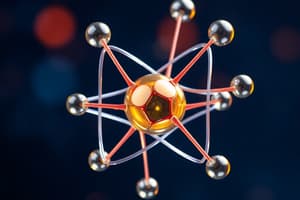Podcast
Questions and Answers
What does the pH of 7 signify on the pH scale?
What does the pH of 7 signify on the pH scale?
- A basic solution
- An acidic solution
- A neutral solution (correct)
- An unknown solution
In chemistry, what do acids do in terms of hydrogen ions?
In chemistry, what do acids do in terms of hydrogen ions?
- Produce hydrogen ions
- Neutralize hydrogen ions
- Donate hydrogen ions (correct)
- Absorb hydrogen ions
What type of substances react to form salts in chemistry?
What type of substances react to form salts in chemistry?
- Bases and solids
- Liquids and salts
- Acids and bases (correct)
- Acids and gases
What does stoichiometry deal with in chemistry?
What does stoichiometry deal with in chemistry?
What is the purpose of phase diagrams in chemistry?
What is the purpose of phase diagrams in chemistry?
What is the main focus of reaction mechanisms in chemistry?
What is the main focus of reaction mechanisms in chemistry?
What is the conceptual framework for organizing and understanding the properties of elements?
What is the conceptual framework for organizing and understanding the properties of elements?
Which scientist laid the foundation of modern chemical theory during the Scientific Revolution?
Which scientist laid the foundation of modern chemical theory during the Scientific Revolution?
What are substances made up of only one type of atom called?
What are substances made up of only one type of atom called?
In a chemical reaction, what occurs when atoms and molecules form or break bonds?
In a chemical reaction, what occurs when atoms and molecules form or break bonds?
Who contributed to the birth of the periodic table in the 18th century?
Who contributed to the birth of the periodic table in the 18th century?
What illustrates the relationships between reactants and products in a chemical reaction?
What illustrates the relationships between reactants and products in a chemical reaction?
Study Notes
Exploring the Wonders of Chemistry
Chemistry, the scientific study of matter and its interactions, is a vast and fascinating field that touches almost every aspect of our daily lives. In this article, we'll dive into the intricacies of this science, uncovering its history, fundamental concepts, and real-world applications.
Origins and Foundations
Chemistry, as we know it today, began during the Scientific Revolution in the 17th century. The pioneering work of alchemists like Robert Boyle, who established the foundation of modern chemical theory, laid the groundwork for the development of chemistry as a distinct scientific discipline. The 18th century saw the birth of the periodic table, a conceptual framework for organizing and understanding the properties of elements, thanks to the contributions of Johan Laveger and Henry Cavendish.
Atoms, Molecules, and Elements
The fundamental building blocks of matter are atoms, which come together to form molecules. Elements are substances made up of only one type of atom, while compounds are formed when atoms of different elements bond together. These building blocks interact via chemical reactions, occurring when atoms and molecules form or break bonds, resulting in a change in the composition of substances.
Reaction Mechanisms and Chemical Equations
Chemical reactions follow balanced chemical equations, which illustrate the relationships between reactants and products involved in a reaction. Reaction mechanisms delineate the step-by-step process of how reactants are converted into products, often involving the formation and breaking of chemical bonds.
States of Matter and Changes of State
Matter can exist in three main states: solid, liquid, and gas. Heating or cooling a substance can cause it to change state, a phenomenon known as a phase transition. Phase diagrams are visual representations that help us understand the conditions under which these changes occur.
Acids, Bases, and Salts
Acids and bases are substances that react to form salts. Acids donate hydrogen ions, while bases accept them. The pH scale, which ranges from 0 to 14, is used to measure the acidity or basicity of a solution. A pH of 7 indicates a neutral solution, while a pH less than 7 signifies an acidic solution, and a pH greater than 7 indicates a basic solution.
Stoichiometry and Chemical Calculations
Stoichiometry, the quantitative aspect of chemistry, deals with the relationships between reactants and products in a chemical equation. Balancing chemical equations, writing stoichiometric equations, and performing calculations based on these equations are essential skills.
Real-World Applications of Chemistry
Chemistry's applications are wide-ranging, from the production of everyday items like pharmaceuticals, cosmetics, and detergents to the development of advanced materials like semiconductors and nanotechnology. Understanding chemistry is also vital in environmental protection efforts, such as combating pollution and promoting sustainable practices.
Conclusion
Despite its complexity, chemistry offers an endlessly fascinating journey through the nature of matter. By studying its foundations, we uncover the mysteries of the world around us and harness the power of this science to improve our lives and safeguard the future. As we continue to explore the wonders of chemistry, we can look forward to new discoveries, technologies, and applications that will shape our world in ways we cannot yet imagine.
Studying That Suits You
Use AI to generate personalized quizzes and flashcards to suit your learning preferences.
Description
Delve into the vast and fascinating world of chemistry with this article, covering the origins, fundamental concepts, and real-world applications of this essential science. Explore the history of chemistry, the building blocks of matter, chemical reactions, states of matter, acids and bases, stoichiometry, and the diverse applications of chemistry in everyday life and beyond.




